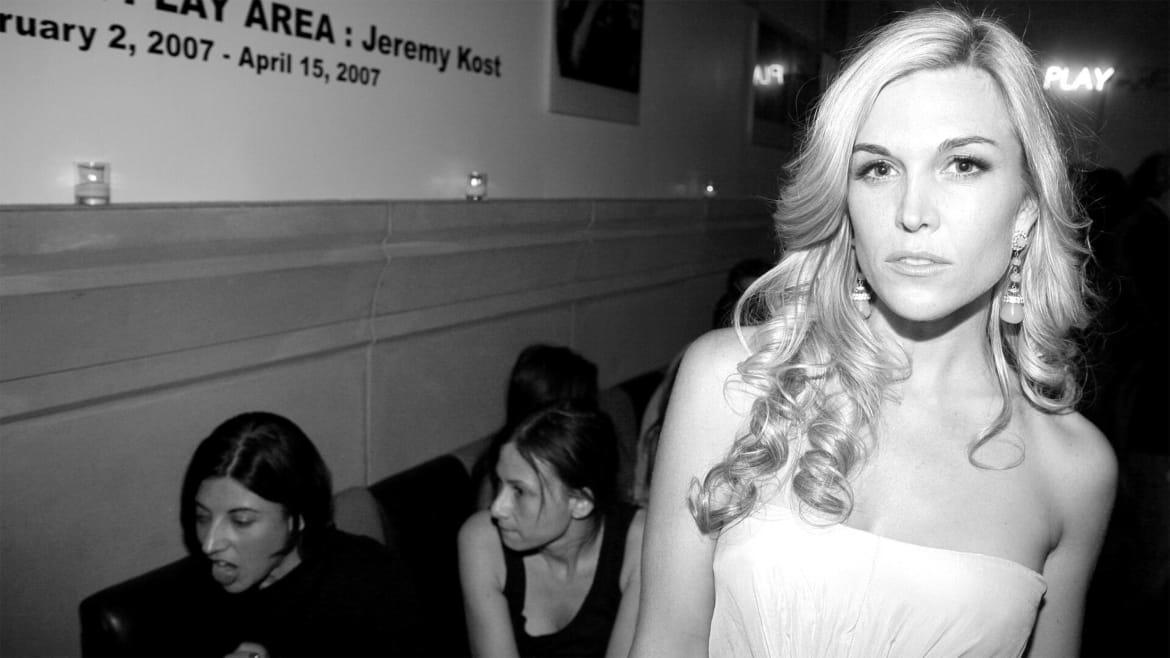How We Turned Random Blonde Women Into Our Socialite Queens

- Oops!Something went wrong.Please try again later.
- Oops!Something went wrong.Please try again later.
It may seem like a distant memory now, but the early 2000s really were the Wild West online. Even the most cockamamie decisions currently being made on Elon Musk’s Twitter hellscape are laughable compared to the scandals, gossip, and celebrity created in the confines of the world wide web in the early days of blogging. Sites like the first iteration of Gawker, Guest of a Guest, and Oh No They Didn’t had the power to make—and keep—anyone famous, at the discretion of faceless nobodies with an internet connection. If you had a voice with some bite, you basically held the keys to the golden gates of high society.
With the amount of drama percolating both behind the keyboards and in front of flashbulbs—and the lasting effect that the amateur blogosphere had on not just journalism, but celebrity and culture—this era is ripe for a revisit. Queenmaker: The Making of an It Girl, which premieres on Hulu on May 17, purports to be that much-needed, juicy examination.
The documentary has a fabulous collection of knowledgeable talking heads—including notorious figures like Kelly Cutrone and Patrick McMullen—who provide genuine insight into a once-gilded age, now melted down for scrap. But this is really just a frustrating misdirection for the documentary’s real subject, one of those aforementioned faceless bloggers, whose compelling, if deflated, story fills the doc’s back half. Queenmaker fumbles its momentum and loses its novelty because of this bifurcation. Though certainly disappointing, the film is still a uniquely mystifying look at a bygone era that will satisfy those who were steeped in its libelous thrills.
Queenmaker opens with one of the most jarring and outrageously perfect introductions to any documentary that I’ve ever seen. A low, half-slurred, mysterious voice narrates a sequence of vaguely religious B-roll footage, monologuing about how Christianity made God, “once a distance figure,” into a man. Eventually, they find their way to the point: “It is no surprise that 2000 years later … we now worship the celebrity, the American God.” Upon our storyteller speaking the word “celebrity,” there’s a genius, hysterical cut to what is likely some old Getty Images archival footage from nearly two decades ago, of socialite Tinsley Mortimer posing for paparazzi.
If you know Tinsley Mortimer, or even have a vague idea of what she represented to the blogosphere back in the day, then this will elicit both a cackle and a cheer. Mortimer was once the most consistently visible in a handful of perennially climbing socialites, sort of the Paris Hilton of New York’s society pages. Mortimer was famous for being famous, but unlike the other debutantes she came up with, she wasn’t the traditional package that one might expect to find in someone dominating the scene. Mortimer might’ve been pretty, white, and blonde, but she married into her standard oil heir’s name, and actually worked (well, she lifted a finger) to attain the notoriety she was after. Others, like Casey Johnson, Fabiola Beracasa, and Amanda Hearst, were handed privilege on a platter.
The film takes a fascinating detour through Mortimer’s New York, using her insider status as a way to expound the coveted lifestyles she represented, no longer walled off by velvet ropes. Interview subjects like Cutrone, the hilariously outspoken publicist; McMullen, a famed event photographer; and Mortimer herself uncover all of the dirty details. There are club nights at the infamous Bungalow 8, and the wild lengths that socialites were going to in order to maintain their rank, running to as many as seven parties a night in different dresses, changing outfits so the New York Post would run multiple photos of them.
Queenmaker dissects these inscrutable moments with a savvy style, effortlessly bopping along from point to point with engaging post-production effects acting as a narrative visual aid. (Though, at times, it can look a little too Angela Anaconda freaky—and if you’re old enough to be reading this because you too were immersed in the blog scene back then, you definitely know what I mean.)
Trace Lysette Ensured ‘Monica’ Was No Ordinary Trans Film
Mortimer’s astuteness allows the documentary to faithfully look at the impact of the culture blogs at the time, with former Gawker editor Emily Gould, whose work dashed the dreams of a million socialites, adding her perspective. It’s almost entrancing to look back at this time, at an unregulated internet where you could become just as famous for slandering someone as you could for being slandered.
One site that opted to move away from active defamation was Park Avenue Peerage, a document of bona fide, upcoming socialites that seemed to speak about its subjects with the grace of someone with firsthand knowledge. Rumors swirled about the author of the site. Back then, anonymity was a difficult thing to protect, especially when recording the moves of the rich and powerful. Eventually, a New York Magazine profile revealed the site’s scribe to be James Kurisunkal, an 18-year-old college student who had never even been to the Big Apple. Kurisunkal quickly became an object of fascination, just like the glitterati Park Avenue Peerage chronicled, and scooped up an internship at New York not long after, which led to crossing paths with God herself: Tinsley Mortimer.
Then, Queenmaker becomes something much more focused—to its detriment. The film zooms in on the life of Kurisunkal, who is now Morgan Olivia Rose. After her brief time rubbing shoulders with the socialites she once covered, Morgan left New York and eventually transitioned, and now specifically defines herself as a “transsexual” woman. Our mysterious narrator from the beginning of the film is revealed to be Rose, who plucked her own prose from Park Avenue Peerage to narrate a film that would dive into her archives. The “twist” is a completely unexpected one, and Queenmaker spends the duration of its runtime finding out how Rose made herself in the image of her creators, so to speak.
To spoil any more than that would be to go too far into the set of truly shocking circumstances that have led to Rose’s current life. But watching as she looks back, through some mangled lens of reality that clearly seems distorted to her own preference, is undeniably enthralling. And it would be an even more welcome twist if Queenmaker didn’t snag its swift pace on Rose’s thorniness. Watching as she tries to make sense of her own youthful naivete is spellbinding, sure. But what about the blogs? What about all of the other socialites? What about the larger set of ramifications that Queenmaker was setting itself up to expose before it suddenly narrowed its narrative?

That’s what the film seeks to do by spending so much time with Rose, but it circles the point, refusing to land. The Aughts-era gossip blogs deserve a proper doc. Hell, maybe even a three-part limited docuseries. No doubt that I, and the millions of others who spent countless hours of their youth trolling Oh No They Didn’t for gossip, would devour it. The film is not so much a study of blogs or socialites as it is of the pattern of human behavior that pushed society to need both of those things, for different reasons.
The hazy blur of the socialite heyday must have dozens of stories like Rose’s—of other civilians blinded by their brushes with stardom—that need to be told to truly understand the depth of that period’s impact. Yet, even with all of the doc’s charming weirdness, that wider significance is missing because of its disjointed framing, leaving Queenmaker: The Making of an It Girl as muddled as the memory of a celebutante waking up after a night at Tao.
Like this review? Sign up to get our weekly See Skip newsletter every Tuesday and find out what new shows and movies are worth watching and which aren’t.
Get the Daily Beast's biggest scoops and scandals delivered right to your inbox. Sign up now.
Stay informed and gain unlimited access to the Daily Beast's unmatched reporting. Subscribe now.

